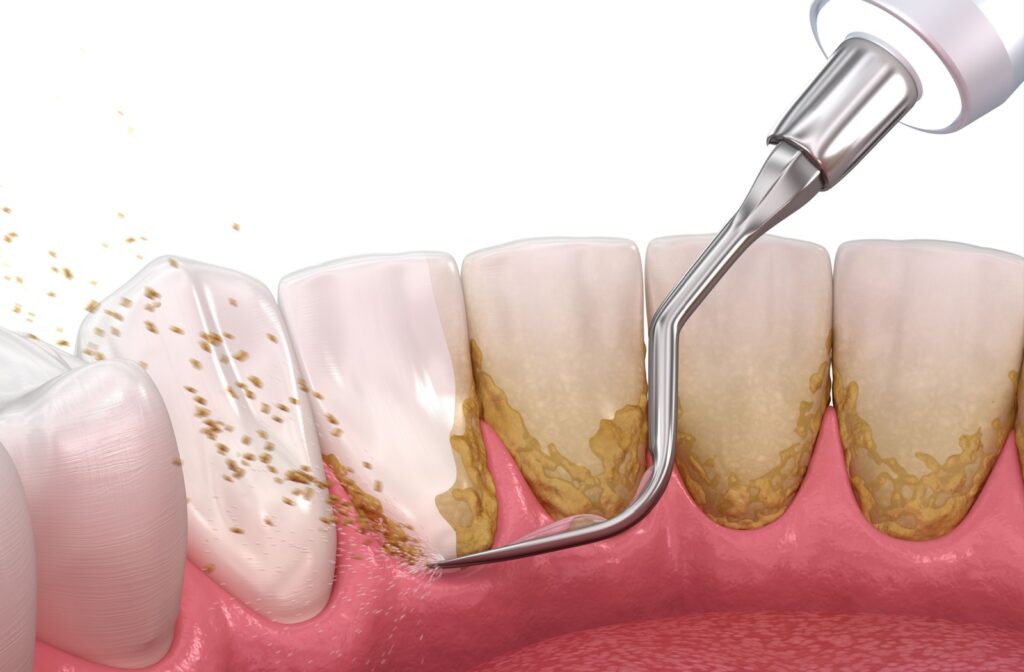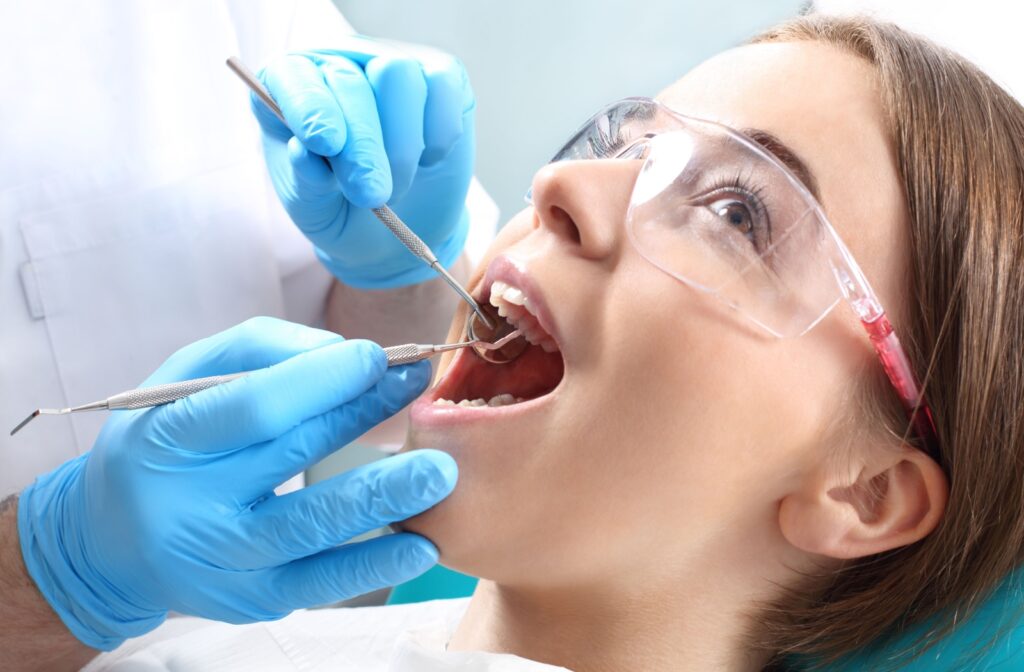Dental scaling is the part of your routine dental cleaning that focuses on the pockets between the teeth and gums. We carefully remove plaque, tartar, and leftover debris accumulated since your last visit using specialized tools and precision.
You might feel slight discomfort during this process, but it’s a vital step during a routine cleaning. Dental scaling helps lower your risk of gum disease or prevent gum disease from progressing.
Even with the most diligent oral hygiene routines, leftover plaque and debris can accumulate and are challenging to address without professional interventions. That’s why routine dental cleanings and exams benefit everyone!
What Is Dental Scaling?
Dental scaling is a component of a routine dental cleaning that focuses on removing plaque, bacteria, and tartar (hardened plaque) from your teeth and gums. This procedure is precisely why we emphasize daily brushing and flossing.
Leftover plaque hardens into tartar (which can lead to gum disease), which we can only remove through dental scaling. Beyond just a cleaner smile, dental scaling is an important part of oral care:
- Prevents gum disease: Scaling removes tartar and bacteria that accumulate below the gumline, reducing the risk of periodontal diseases like gingivitis and periodontitis.
- Freshens breath: Bacteria trapped beneath the gumline can cause persistent bad breath. Dental scaling helps eliminate this issue at its source.
- Protects your smile: Advanced gum disease is a leading cause of tooth loss. Addressing tartar buildup early reduces your chances of gum recession, loose teeth, or tooth loss later on.
- Improves overall health: Poor oral health has been linked to conditions such as heart disease and diabetes. Keeping your gums healthy can have a positive impact on your overall wellness.
As a general rule, we encourage a routine cleaning and exam every 6 months. Not only does this keep your teeth and gums happy, but we can also identify and address potential concerns, like gum disease, early for timely management.
In other words, addressing minor issues early is always better than letting them snowball into more serious and complex concerns. Consider routine dental cleanings and exams your first line of defence.

What Happens During a Dental Scaling?
Dental scaling is a normal part of every routine dental cleaning and exam. Our team at Sundance Dental Clinic team will do whatever we can to make you feel more comfortable during this process.
The Procedure
We will begin by examining your teeth and gums. We may use a small mirror to check for signs of gum inflammation or tartar buildup.
Next, we’ll use specialized tools, like a scaler or ultrasonic device, to gently remove plaque, bacteria, and tartar from the surfaces of your teeth, focusing on areas below the gumline, and washing any debris away with water.
After scaling, we may polish your teeth to remove surface stains and create a smooth, clean surface that helps prevent future plaque buildup.
Dental scaling interrupts the cycle of gum disease by removing plaque and tartar from the gumline. It reduces pockets of depth that form between the teeth and gums, allowing the gums to heal and reattach more firmly to the teeth.
What Does Dental Scaling Feel Like?
The overall sensation will vary depending on the extent of tartar buildup and gum sensitivity. It’s normal to feel some pressure or a scraping sensation, but the procedure is generally not painful. If you have sensitive teeth or gums, we can apply a local anesthetic to keep you comfortable.
It’s worth noting that some patients report mild discomfort or tenderness around the gums after the procedure, but this usually subsides within a day or two.
After-Care Following a Dental Scaling
Now, how do you maintain the results of your dental scaling? Proper after-care is essential for healing and long-term benefits.
It’s best to remain gentle and careful following a dental cleaning to avoid any discomfort. Here are some helpful after-care tips to follow immediately after your dental cleaning:
- Expect mild sensitivity: It’s normal to experience some gum tenderness or slight tooth sensitivity after scaling. Over-the-counter pain relievers or saltwater rinses can help soothe any discomfort.
- Avoid certain foods: Steer clear of hot, cold, or spicy foods for the first day or two after your appointment, as your teeth may feel more sensitive during this time.
- Brush and floss gently: Keep up with your oral hygiene routine, but be gentle around your gums for the first few days. Use a soft-bristled toothbrush to avoid irritation.
- Stay hydrated: Drink plenty of water to flush out bacteria and promote healing.
After a dental cleaning, it’s never a bad idea to maintain the benefits of your dental scaling. Adopt these habits and stay consistent:
- Brush twice daily: Proper brushing technique is key! Consider using an electric toothbrush for a more thorough clean.
- Floss daily: Flossing removes plaque from areas that your toothbrush can’t reach, preventing tartar from forming between your teeth.
- Use an antimicrobial mouthwash: An antimicrobial rinse can reduce bacteria in your mouth, helping to keep your gums healthy.
- Visit your dentist regularly: Routine dental check-ups and professional cleanings are crucial for catching and preventing oral health issues.
Invest in a Healthy Smile
A beautiful smile is so much more than bright teeth. Keeping your teeth and gums healthy and clean is an investment worth making.
Though simple, dental scaling effectively prevents gum disease, maintains fresh breath, and safeguards your overall well-being.
If it’s been a while since your last dental exam or you’re due for a routine cleaning, it’s time to connect with our Sundance Dental Clinic team. Book an appointment and take a step toward a healthier smile!





